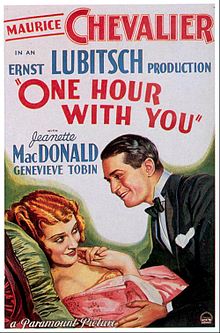
George Dewey Cukor was an American film director and producer. He mainly concentrated on comedies and literary adaptations. His career flourished at RKO when David O. Selznick, the studio's Head of Production, assigned Cukor to direct several of RKO's major films, including What Price Hollywood? (1932), A Bill of Divorcement (1932), Our Betters (1933), and Little Women (1933). When Selznick moved to Metro-Goldwyn-Mayer in 1933, Cukor followed and directed Dinner at Eight (1933) and David Copperfield (1935) for Selznick, and Romeo and Juliet (1936) and Camille (1936) for Irving Thalberg.

The Smiling Lieutenant is a 1931 American pre-Code musical comedy film directed by Ernst Lubitsch, starring Maurice Chevalier, Claudette Colbert and Miriam Hopkins, and released by Paramount Pictures.

Maurice Auguste Chevalier was a French singer, actor, and entertainer. He is perhaps best known for his signature songs, including "Livin' In The Sunlight", "Valentine", "Louise", "Mimi", and "Thank Heaven for Little Girls", and for his films, including The Love Parade, The Big Pond, The Smiling Lieutenant, One Hour with You, and Love Me Tonight. His trademark attire was a boater hat and tuxedo.
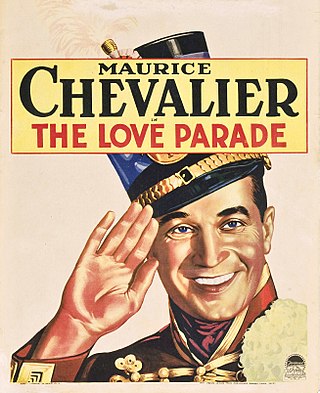
The Love Parade is a 1929 American pre-Code musical comedy film, directed by Ernst Lubitsch and starring Maurice Chevalier and Jeanette MacDonald, involving the marital difficulties of Queen Louise of Sylvania (MacDonald) and her consort, Count Alfred Renard (Chevalier). Despite his love for Louise and his promise to be an obedient husband, Count Alfred finds his role as a figurehead unbearable. The supporting cast features Lupino Lane, Lillian Roth and Eugene Pallette.

Love Me Tonight is a 1932 American pre-Code musical comedy film produced and directed by Rouben Mamoulian, with music by Rodgers and Hart. It stars Maurice Chevalier as a tailor who poses as a nobleman and Jeanette MacDonald as a princess with whom he falls in love. It also stars Charles Ruggles as a penniless nobleman, along with Charles Butterworth and Myrna Loy as members of his family.

Jeanette Anna MacDonald was an American singer and actress best remembered for her musical films of the 1930s with Maurice Chevalier and Nelson Eddy. During the 1930s and 1940s she starred in 29 feature films, four nominated for Best Picture Oscars, and recorded extensively, earning three gold records. She later appeared in opera, concerts, radio, and television. MacDonald was one of the most influential sopranos of the 20th century, introducing opera to film-going audiences and inspiring a generation of singers.

That's Entertainment! is a 1974 American compilation film released by Metro-Goldwyn-Mayer to celebrate the studio's 50th anniversary. The success of the retrospective prompted a 1976 sequel, the related 1985 film That's Dancing!, and a third installment in 1994.

Roland Young was an English-born actor. He began his acting career on the London stage, but later found success in America and received an Academy Award nomination for his role in the film Topper (1937).

This Is the Night is a 1932 American pre-Code comedy film directed by Frank Tuttle, and starring Lili Damita, Charles Ruggles, Roland Young, Thelma Todd, and Cary Grant in his film debut. It was made by Paramount Pictures.

Maytime is a 1937 American musical and romantic-drama film produced by MGM. It was directed by Robert Z. Leonard, and stars Jeanette MacDonald and Nelson Eddy. The screenplay was rewritten from the book for Sigmund Romberg's 1917 operetta Maytime by Rida Johnson Young, Romberg's librettist; however, only one musical number by Romberg was retained.

Genevieve Tobin was an American actress.

New Moon is a 1940 American musical film released by Metro-Goldwyn-Mayer and directed by Robert Z. Leonard, with uncredited direction by W. S. Van Dyke.

The Cat and the Fiddle is a 1934 American pre-Code romantic musical film directed by William K. Howard based on the hit 1931 Broadway musical of the same name by Jerome Kern and Otto A. Harbach, about a romance between a struggling composer and an American singer. The film stars Ramon Novarro and Jeanette MacDonald in her MGM debut.

The Merry Widow is a 1934 film adaptation of the 1905 operetta of the same name by Franz Lehár. The film was directed and produced by Ernst Lubitsch starring Maurice Chevalier and Jeanette MacDonald with a supporting cast featuring Edward Everett Horton, Una Merkel, Sterling Holloway, Donald Meek, Jason Robards Sr. and Akim Tamiroff. A French-language version was produced at the same time and released in France the same year as La Veuve joyeuse with some but not all of the same cast. Lorenz Hart and Gus Kahn wrote new English lyrics for some Lehar songs under the musical direction of Herbert Stothart.
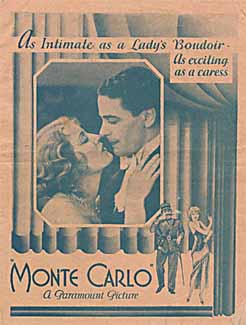
Monte Carlo is a 1930 American pre-Code musical comedy film, directed by Ernst Lubitsch. It co-stars Jack Buchanan as a French Count Rudolph Falliere masquerading as a hairdresser and Jeanette MacDonald as Countess Helene Mara. The film is notable for introducing the song "Beyond the Blue Horizon", which was written for the film and is first performed by MacDonald and a chorus on the soundtrack as she escapes on the train through he countryside. Monte Carlo was hailed by critics as a masterpiece of the newly emerging musical film genre. The screenplay was based on the Booth Tarkington novel Monsieur Beaucaire.

Hotel Haywire is a 1937 American comedy film written by Preston Sturges with uncredited rewrites by Lillie Hayward. It was directed by George Archainbaud and stars Leo Carrillo, Lynne Overman, Spring Byington, Benny Baker and Colette Lyons.
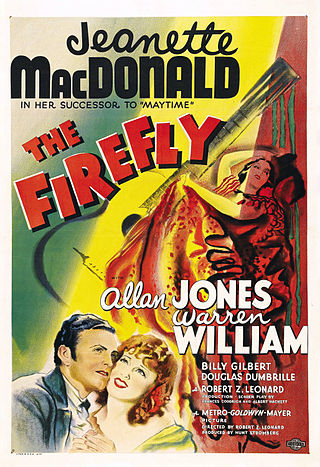
The Firefly is a 1937 American historical musical film directed by Robert Z. Leonard and starring Jeanette MacDonald, Allan Jones and Warren William. The film is an adaptation of the operetta of the same name by composer Rudolf Friml and librettist Otto A. Harbach that premiered on Broadway in 1912. The film used nearly all of the music from the operetta but jettisoned the plot in favor of a new storyline set in Spain during the time of the Emperor Napoleon I. It added a new song, "The Donkey Serenade", which became extremely popular, as was one of the Friml songs, "Giannina Mia". The original release prints of the film were elaborately tinted with Sepia-Blue, Sepia-Orange and Sepia-Blue-Pink.
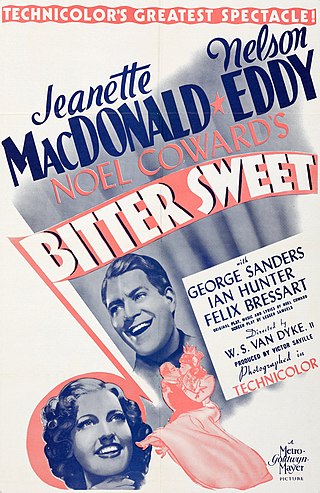
Bitter Sweet is a 1940 American Technicolor musical film directed by W. S. Van Dyke, based on the operetta Bitter Sweet by Noël Coward. It was nominated for two Academy Awards, one for Best Cinematography and the other for Best Art Direction by Cedric Gibbons and John S. Detlie.
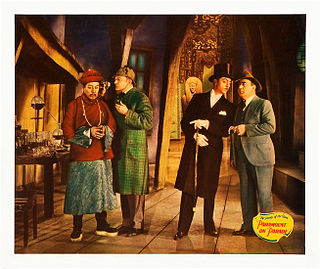
Paramount on Parade is a 1930 all-star American pre-Code revue released by Paramount Pictures, directed by several directors including Edmund Goulding, Dorothy Arzner, Ernst Lubitsch, Rowland V. Lee, A. Edward Sutherland, Lothar Mendes, Otto Brower, Edwin H. Knopf, Frank Tuttle, and Victor Schertzinger—all supervised by the production supervisor, singer, actress, and songwriter Elsie Janis.
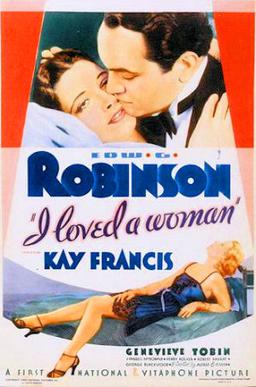
I Loved a Woman is a 1933 American pre-Code drama directed by Alfred E. Green, starring Kay Francis, Edward G. Robinson, and Genevieve Tobin. According to producer Hal Wallis' autobiography, Robinson and Francis "were oddly matched. Kay was so tall that we had to put Eddie [Robinson] on a box in some scenes to bring him level with her and, understandably he was humiliated. Irritable and self-conscious, he argued with Kay frequently. But he [...] gave credit to her fine acting." However, it was Wallis and other executives who also made the choice to cut three of Kay's scenes, leaving her presence in the film really as a supporting actress.
